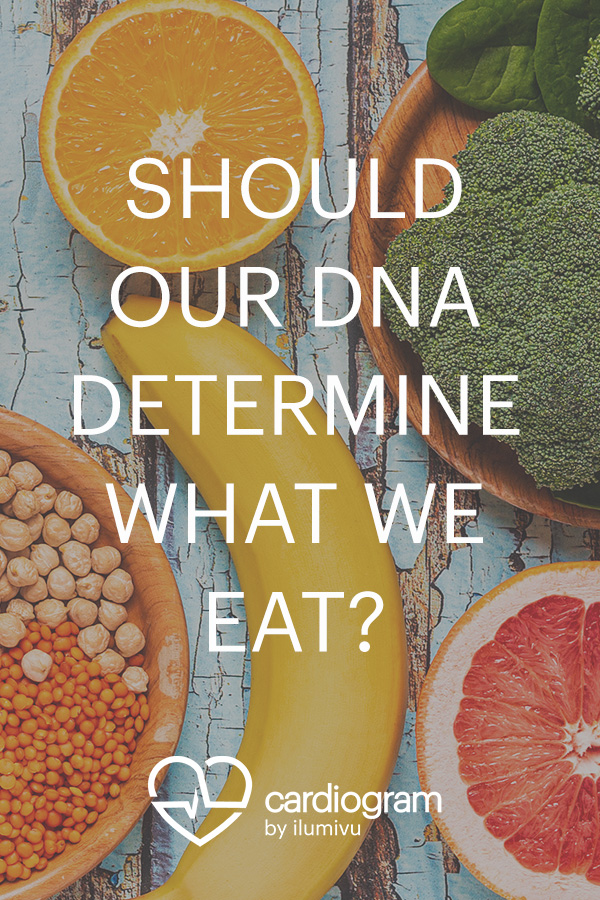Science shows us that most chronic diseases and conditions can be influenced, and even improved, by making changes to our diets1. Your genetics influence your metabolic processes and can either lead to increased risks of certain health conditions or they can protect you from developing those conditions2. Of course, the question then arises, “So, which diet is the right diet?” In truth, the answer is dependent on your individual body. Nutrigenomics is a type of genetic testing that gives you specific information about your particular metabolic processes, as well as how your body responds to certain foods and nutrients. Using these tests, you can find out what diet truly is best for you and your body. Of course, the best way to ensure the effectiveness of any health-related diet is to stick with the suggestions given and follow them over time3. Consistency truly is the key.
Personal genetic testing provides compelling guidance for dietary suggestions at the individual level. This personalized approach is more effective than the current population-directed dietary advice, which has been set by government agencies and other health organizations2;4. Recent research has shown that abandoning the “one-size-fits-all" approach to nutrition and going the more individualized route is more successful in supporting lasting behavioral and dietary change.4;5;6;7;8
Because these plans are based on your specific genetics, it allows you to know that what you’re eating should work for you and your body. This knowing itself aids in conviction to stick with it. Nutrigenomics can also help with managing certain conditions and intolerances, offering personalized dietary changes to aid in that management. It can also offer suggestions for foods to eliminate altogether for conditions like celiac disease, where cutting out certain foods will allow you to feel your best9.

Nutrigenomics is a branch of the nutritional sciences that explores the effects of nutrients on gene function, as well as the effects of genetic variation on how individuals respond to nutrients. The latter, sometimes referred to as nutrigenetics, more specifically focuses on how genetic variation affects biological responses to nutrients and food components.
Nutrigenetics is the science that aims to explain how variations in human genetics alter our individual responses to the foods we eat. How our bodies respond to the components of different foods affects all bodily functions including general health, risk of diet-related chronic disease, body composition, and physical performance6. By moving away from the “one-size-fits-all" approach to nutrition and towards a more individualized method, nutrigenomics is shifting from basic science into actionable healthcare practice and personal lifestyle choices.
Nutrigenomics uses genomic tools and genetic information to examine how nutrient-gene interactions can influence our health. For instance, the proteins (enzymes, transporters, binding proteins, etc.) that are encoded by our genes interact with the foods we eat, ultimately influencing how our bodies respond to them. This interaction then determines what types of foods will be most beneficial for us individually.
The concept of nutrition based on genetics isn’t new. Two classic examples of genetic variation affecting dietary intake are phenylketonuria (PKU) and lactose intolerance. Young people with PKU are at risk of severe neurological damage associated with the build-up of phenylalanine in the brain, unless a low phenylalanine diet is strictly followed. Those with lactose-intolerance have genotypes that result in low production of the lactase enzyme. Because of this, they’re unable to break down the lactose found in dairy products and, consequently, experience gastrointestinal discomfort soon after consuming lactose.
Personalized dietary recommendations for these individuals include avoiding lactose-containing products, taking lactase supplements, or choosing lactose-free milk alternatives to prevent the gastrointestinal symptoms (gas, bloating, diarrhea, stomach cramps, nausea, and sometimes vomiting) associated with lactose intolerance. Research also demonstrates that our genes can affect how we respond to physical activity. This can be seen through variations in weight and body composition despite engaging in the same training program, or in varying risk levels for certain injuries6.
Currently, nutrigenomics testing can be purchased directly by the consumer (DTC) or offered through a healthcare provider. When an individual orders a test directly, if they’re satisfied with the interpretation of their results and feel confident in understanding what the next steps are regarding dietary changes, they don’t necessarily need to share the results with their primary healthcare provider, though we always recommend doing so to get the most out of your investment and to best improve health outcomes.
Cardiogram also offers CardioDNA™ genetic tests which can be found here. CardioDNA™ tests for cardiovascular health, including risk of certain cardiac diseases, and how specific genetic variations influence diet or other lifestyle factors. We then provide a 100+ page report detailing this information, as well as subsequent recommendations based on the test results.
*Note: CardioDNA™ is available in all U.S. states except NY, RI, & PA.
- Gene: A sequence of nucleotides or a segment of DNA that forms part of a chromosome. We can think of a gene as a single unit of genetic information. Everyone has the same genes (for example, CYP1A2 an important liver housekeeping gene), but with potentially different sequence variations.
- Genetic variation: Differences in the sequence of nucleotides (the 4-letter alphabetical code that nature uses to store information in DNA) at a specific region of the genome.
- Single nucleotide polymorphism (SNP): The most common form of genetic variation, which represents a single nucleotide difference (example: a “C” replacing an “A”) at a given position in the human genome.
- Genotype: Refers to an individual’s genetic makeup. Most SNPs give rise to three possible genotypes (e.g., AA, AC, CC).
- Nutrigenomics: The study of the interactions between diet and genetics and subsequent impacts on health and performance. This approach usually includes the effect of genetic variation on response to diet (sometimes called nutrigenetics) and the effects of diet on gene expression.
- Rs number: The reference SNP identification number (rs) identifies the specific location of a SNP.

Research has shown that giving people information about their genes motivates them to adopt healthier dietary habits4;5;6;7;8. Nutrigenomics testing is an additional tool to use, one that can inspire people to make empowered dietary changes specific to their bodies. Information from genetic tests for personalized nutrition combined with knowledge of your current dietary habits, preferences, or restrictions can be used to develop a personalized nutrition plan. Personalized recommendations can help optimize your nutritional status and overall health, while also focusing on preventing diseases.
Interestingly, genetic tests also provide results that determine whether an individual should simply follow typical nutrition recommendations as outlined by federal public health organizations (e.g., Choose MyPlate or Dietary Reference Intakes) or take additional action to further personalize and enhance those recommendations based on their genetic profile. For example, a typical report for genetic test results might refer to two types of (genetic) variants: risk and response. So, if a person possesses the elevated risk variant of the CYP1A2 gene, they have an increased risk for myocardial infarction and hypertension if their caffeine intake exceeds 200 mg daily. This means that reducing their caffeine intake will have a positive impact on their overall health.
Genetic test results are usually reported as a numerical genetic risk score or a category of risk (e.g., low, increased, high); frequently results from multiple genes are combined to provide test results. Every risk is different; there might be a high risk for bone fractures, depending on calcium intake or for low serum iron markers, depending on dietary iron consumption. Bodily responses vary and can be labeled as “High, Medium, or Low” in rank for all of the different categories. For example, certain people respond better than others to losing weight through exercise. These people would see a result which states they have a “Medium-High” or “High Expected Benefit from Exercise.”
Nutrigenomics testing provides valuable information for anyone looking to improve their health or physical performance as well as prevent or better manage chronic diseases and conditions. Incorporating information from the genetic test results allows for more precise dietary and lifestyle recommendations and can highlight important nutritional and physical activity needs.
Genetic-based dietary recommendations are more specific and effective than general recommendations because they are based on how that person’s individual genes interact with certain food components. Certain genetic variations leave people more susceptible to unwanted health outcomes when a specific nutrient in the body is high or low. By basing an individual’s nutritional recommendations on their unique genetics, the benefits of nutrition and physical activity can be maximized, and better health more easily achieved.
1 - Parekh, S., Vandelanotte, C., King, D., & Boyle, F.M. (2012). Design and baseline characteristics of the 10 Small Steps Study: a randomised controlled trial of an intervention to promote healthy behaviour using a lifestyle score and personalised feedback. BMC Public Health, 12,179. https://doi.org/10.1186/1471-2458-12-179
2- Grimaldi, K.A., van Ommen, B., Ordovas, J.M., Parnell, L.D., Mathers, J.C., Bendik, I., Brennan, L., Celis-Morales, C., Cirillo, E., Daniel, H., de Kok, B., El-Sohemy, A., Fairweather-Tait, S.J., Fallaize, R., Fenech, M., Ferguson, L.R., Gibney, E.R., Gibney, M., Gjelstad, I.M.F., Kaput, J., … Bouwman, J. (2017). Proposed guidelines to evaluate scientific validity and evidence for genotype-based dietary advice. Genes & Nutrition, 12, 35. https://doi.org/10.1186/s12263-017-0584-0
3- Desroches, S., Lapointe, A., Ratté, S., Gravel, K., Legare, F., & Thirsk, J. (2011). Interventions to enhance adherence to dietary advice for preventing and managing chronic diseases in adults: a study protocol. BMC Public Health, 11, 111. https://doi.org/10.1186/1471-2458-11-111
4- Horne, J., Madill, J., O’Connor, C., Shelley, J., & Gilliland, J. (2018). A systematic review of genetic testing and lifestyle behaviour change: are we using high-quality genetic interventions and considering behaviour change theory? Lifestyle Genomics, 11(1), 49-63. https://doi.org/10.1159/000488086
5- Nielsen, D.E. & El-Sohemy, A. (2014). Disclosure of genetic information and change in dietary intake: a randomized controlled trial. PLoS One, 9(11), e112665. https://doi.org/10.1371/journal.pone.0112665.
6- Guest, N.S., Horne, J., Vanderhout, S.M., & El-Sohemy, A. (2019). Sport nutrigenomics: Personalized nutrition for athletic performance. Frontiers in Nutrition, 6, 8. https://doi.org/10.3389/fnut.2019.00008. eCollection 2019. Review.
7- Livingstone, K., Celis-Morales, C., Navas-Carretero, S., San-Cristobal, R., Macready, A.L., Fallaize, R., Forster, H., Woolhead, C., O’Donovan, C.B., Marsauz, C.F., Kolossa, S., Tsirigoti, L., Lambrinou, C.P., Moschonis, G., Godleswska, M., Surwillo, A., Drevon, C.A., Manios, Y., Traczyk, I., Gibney, E.R., … Mathers, J.C. (2016). Effect of an Internet-based, personalized nutrition randomized trial on dietary changes associated with the Mediterranean diet: the Food4Me Study. American Journal of Clinical Nutrition, 10(2), 288-297. https://doi.org/10.3945/ajcn.115.129049
8- Hietaranta-Luoma, H.L., Tahvonen, R., Iso-Touru, T., Puolijoki, H., & Hopia, A. (2014). An intervention study of individual, apoE genotype-based dietary and physical-activity advice: impact on health behavior. Journal of Nutrigenetics and Nutrigenomics, 7(3), 161-174. https://doi.org/10.1159/000371743
9- Zhang, X., Qi, Q., Zhang, C., Smith, S.R., Hu, F.B., Sacks, F.M., Bray, G.A., & Qi, L. (2012). FTO genotype and 2-year change in body composition and fat distribution in response to weight-loss diets: The POUNDS LOST Trial. Diabetes, 61(11), 3005-3011. https://doi.org/10.2337/db11-1799




